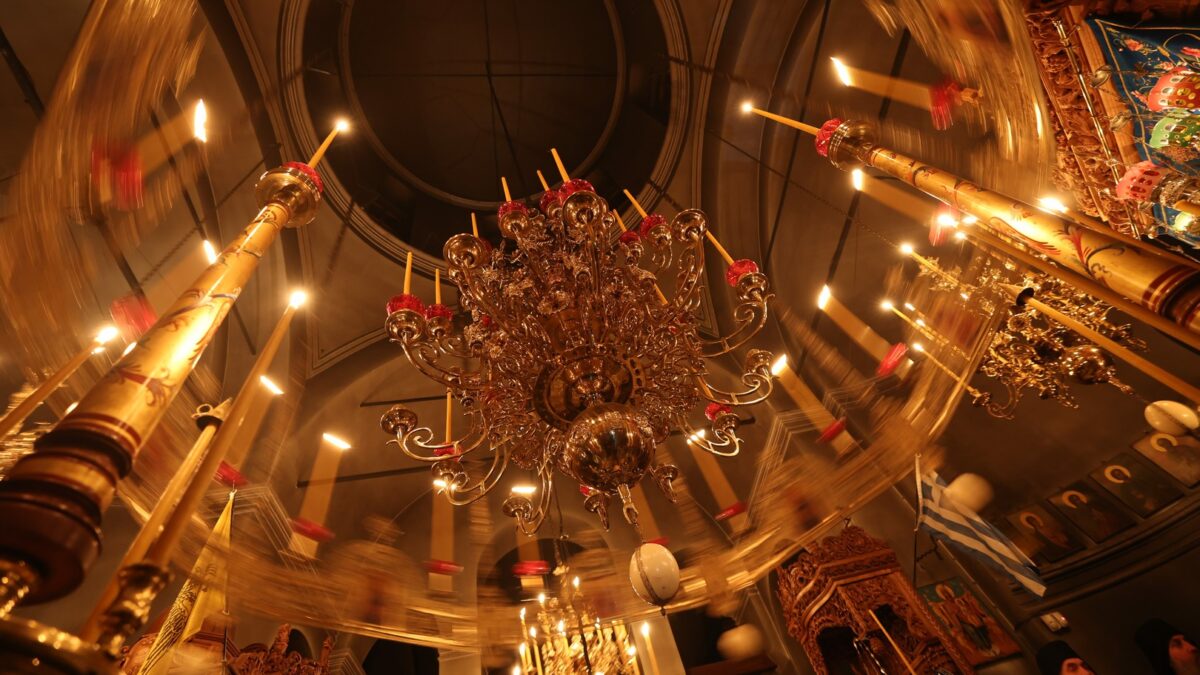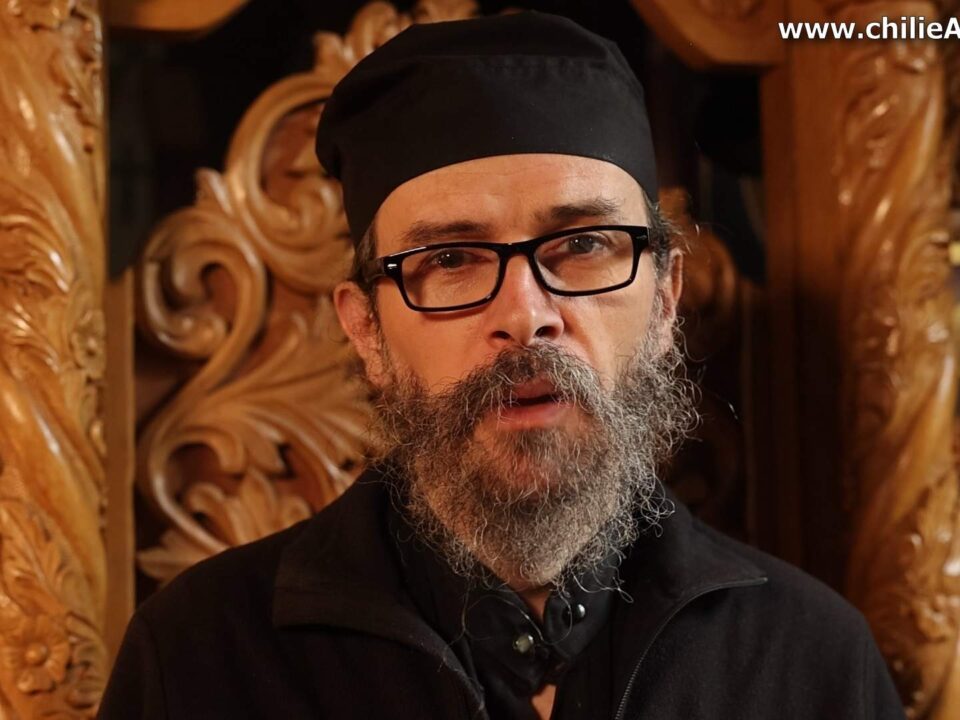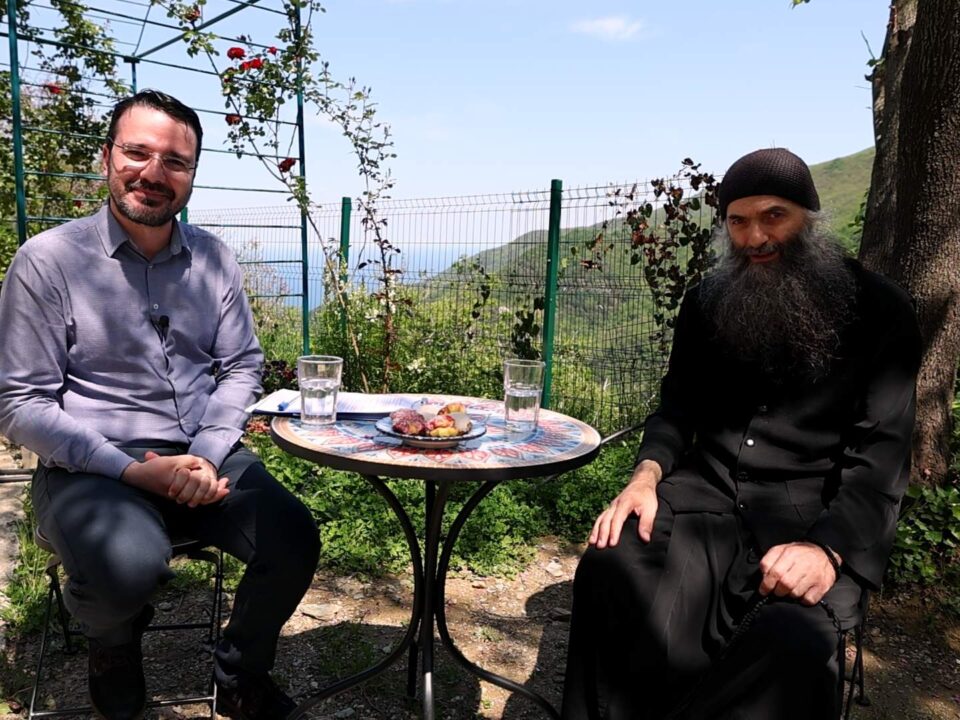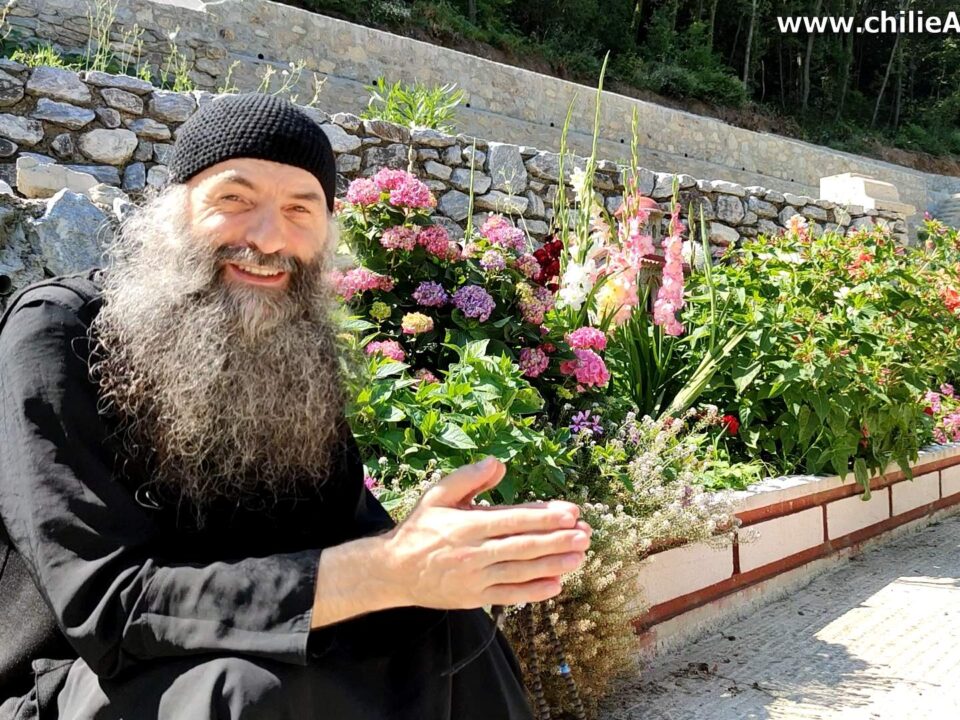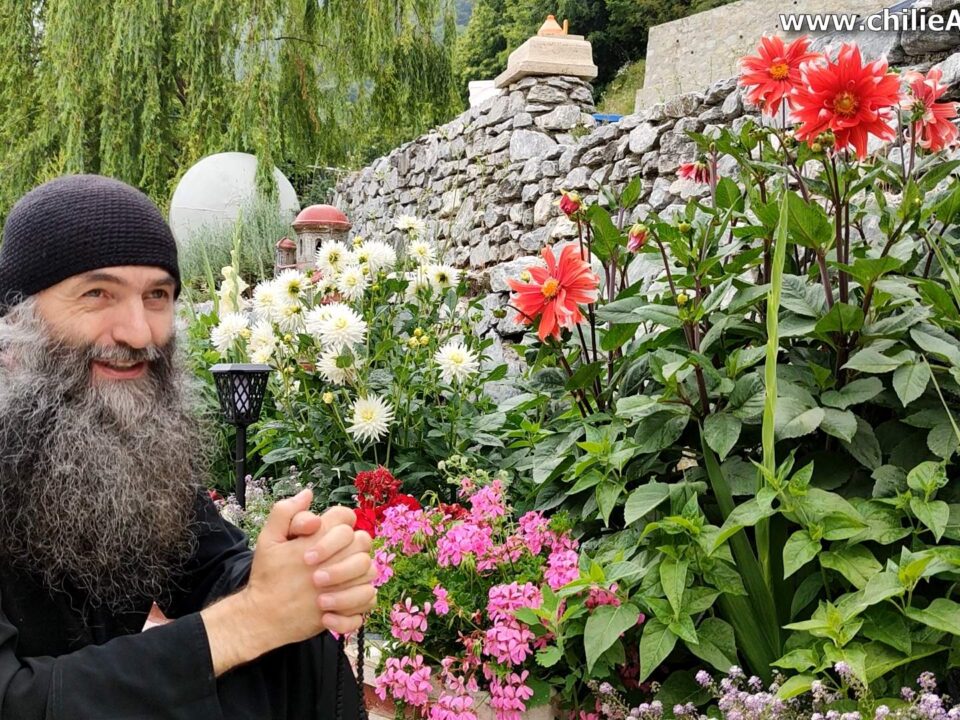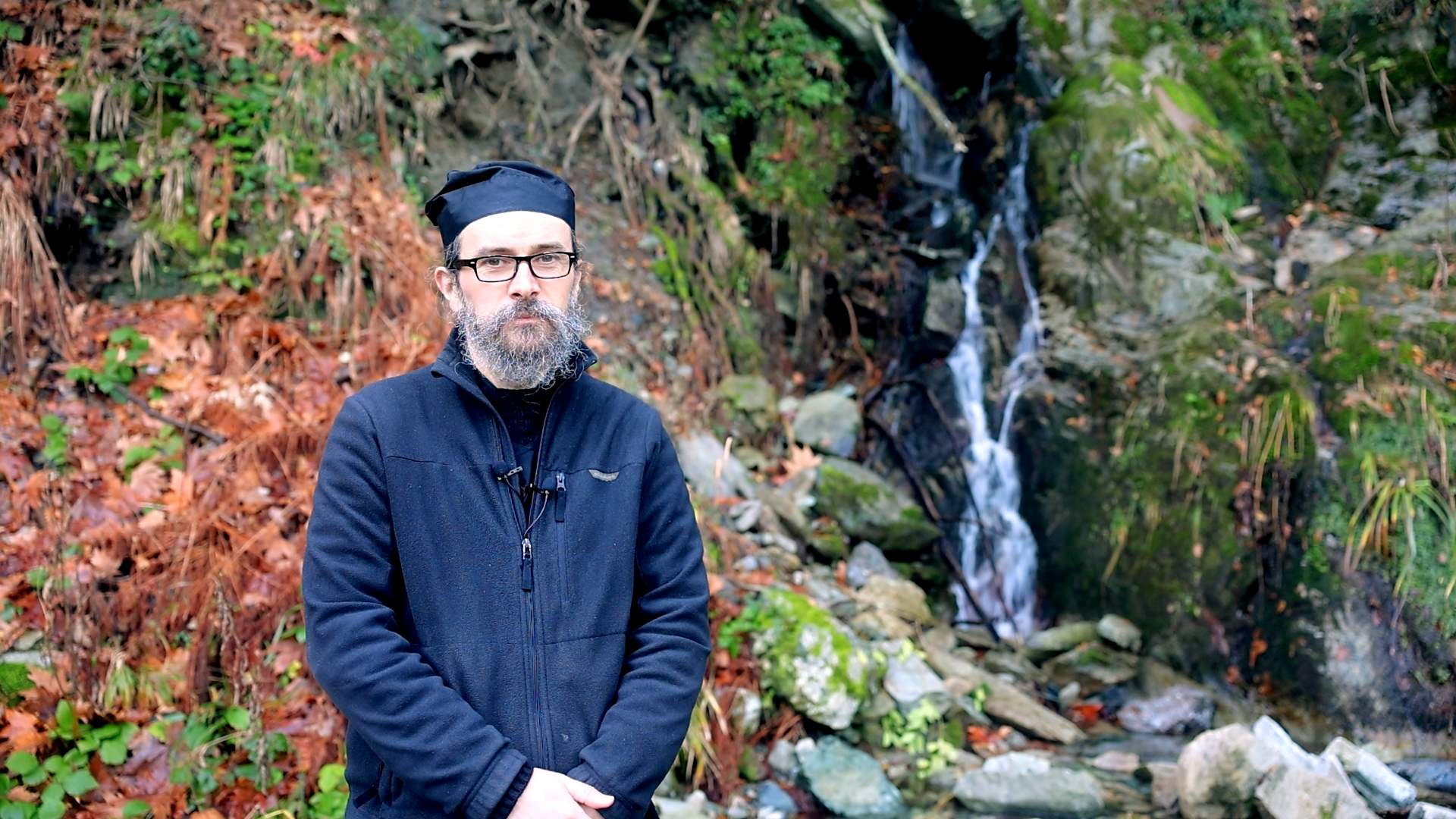
Fasting, Guarding the Mind, Christ and the Devil – Father Theologos
17 January 2023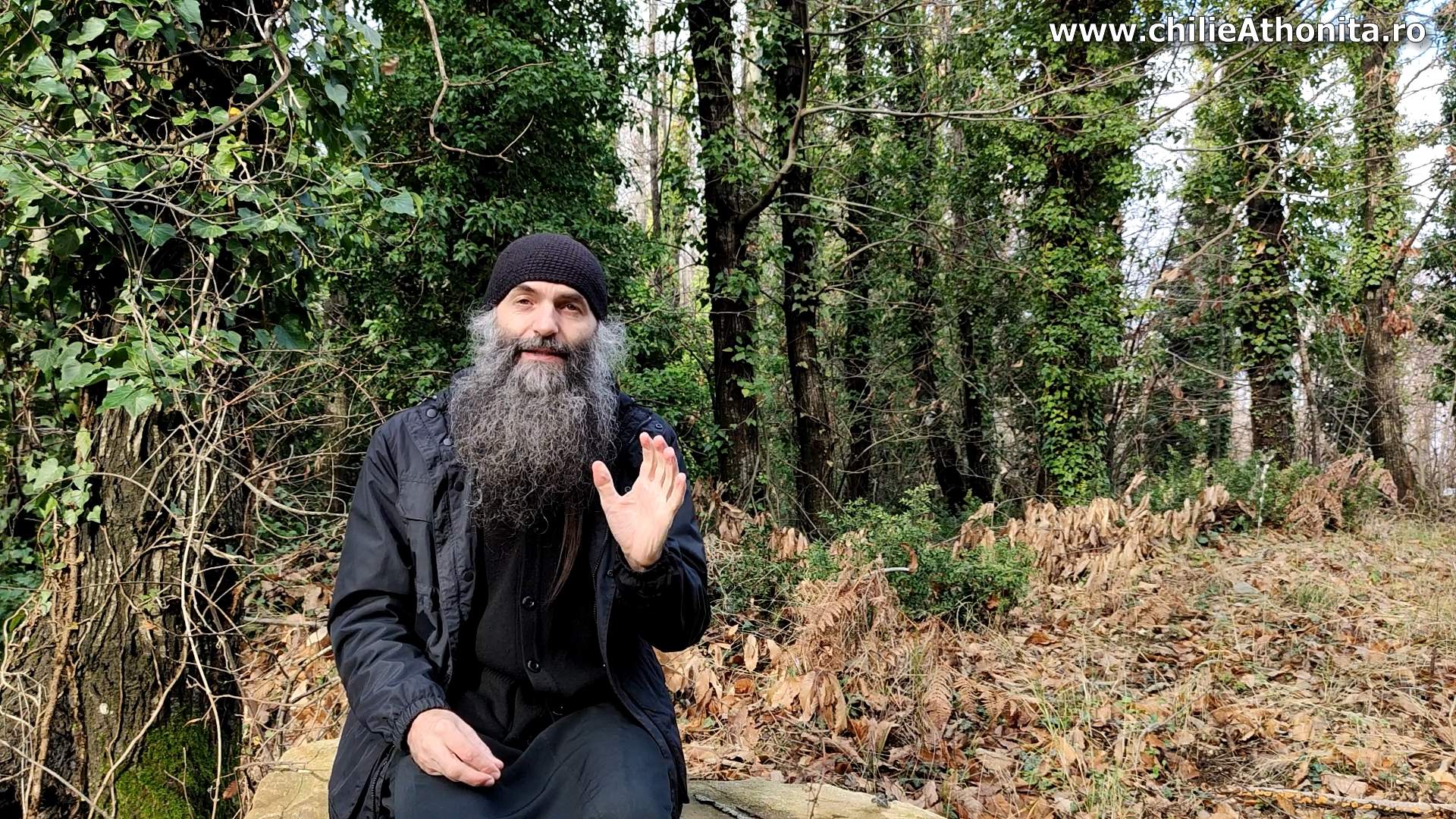
Young People Face-To-Face With the Values of Life – Father Pimen Vlad
21 January 2023Listen to a marvelous interview with father Pimen Vlad about the joy of Faith.
Enjoy!
Presenter: “Lord, I believe; help my unbelief!!” Folks, welcome to a new edition of your show of the soul, “Windows to the Soul”, edition that we are doing in a wonderful place. We are in Mount Athos, at the cell of the Entrance of the Theotokos into the Temple, Lacu Skete.
With us is Father Abbot Pimen Vlad.
Father, God help us, thank you for welcoming us here, at your holiness’ cell, as is natural, I think, let’s talk about faith, because, isn’t it right, faith is at home… At the risk of asking you so abruptly, yet I do, I ask you as in catechism. What is faith?
Fr. Pimen: Faith… I sometimes say, “What does it mean to trust God?” I mean, don’t take it literally [but it means] throwing yourself into the abyss without doubting for a moment that God will catch you.
Presenter: Is it a matter of life and death?
Fr. Pimen: So you either believe it or you don’t believe it. There are no half measures here, that “God, you know, if you can do something.” With God there is no such thing as “If you can.” God can do anything. If He doesn’t fulfill something we ask for, it means it isn’t in our benefit. But it’s not that God can’t, and “Lord, if you can, do something!” What did the Savior say, “But do you believe?”, “I believe, Lord, help my unbelief!”
That is, he realized that he is wrong and that God can do anything. So that’s where faith starts. That is, total trust in God. Because this is why fear comes, anxiety comes, because of lack of faith. Because the man who truly trusts God no longer doubts or fears anything. You will hear as it says there, rumors of wars, rumors of diseases… they must be, but with what prevents us from drawing closer to God?
It should help us draw closer to God, because there is talk of all kinds of foolishness in this world all the time. And then we should trust God more, that God can do everything, and through God we can do everything. And faith means trusting God totally. And then nothing is no longer impossible, the impossible disappears.
Presenter: So can’t the two, faith and unbelief, work together in the same person?
Fr. Pimen: But they have nothing to do with each other, that is, why was it said “believers and unbelievers?” Immediately it was separated, this very word, within the church, that the unbelievers came, there were all those who did not believe, the believers, those who believed totally. Why do we have heaven full of saints, on the calendar that we venerate… because they were those who totally believed in God. They had wealth, they had riches, but they were no longer interested in anything, “I am a Christian!” They would cut him to pieces, make him…”I’m a Christian,” so he had total hope in God. He believed, so he didn’t let himself be guided by sight, but by faith.
Presenter: Where do we get faith from?
Fr. Pimen: This belief comes, it’s just like a practice of this, you do a sport, and you want to reach performance, right? The same applies in faith, you don’t suddenly have faith or something like that. But you have to force yourself, that is, in any problem, like an illness came to your child, yes? And you sit, and you go to the doctor and despair takes you, because he tells you there’s no chance, “No, I believe in God that God can heal my child, but if it’s useful for me, if it’s useful for the child to live.” And then you trust God completely. And God can heal him, for your faith or maybe not. But that doesn’t mean you don’t have faith, faith intervenes again in case your child leaves this world and you don’t turn away from God. Trust that God did the best. So that, too, is faith, even if God didn’t respond to your prayers. But you also believe in God because God allowed it to. So this has to be fought with ourselves over time. Cling to God in any problem, not allowing any separation from God, but cling more strongly to God. God has allowed the trouble to come over us, He knows what is useful to us. “Lord do not leave me, Lord help my unbelief,” let us ask God for faith and then God gives us!
Presenter: This was the natural question about what you said, the course of faith, unbelief, if a prayer we consider was not heard, how do we manifest ourselves?
Fr. Pimen: But every prayer is answered. It’s not fulfilled… It’s another thing, that it’s not fulfilled, but it’s listened to. God if He says that the intention of the thought… any tendency of ours, whether it’s passionate, whether it’s pure or so on… it does not escape God. All of this is passed as they say through a filter. How can God not hear us?
But do you know where it starts? God listens to us to the extent that we listen to him. He tells us, “Thou shalt not kill, thou shalt not steal,” thou shalt not do so and so, the commandments tell us. I do all this, so I break it and say,
“God help me in this matter, help my child, help my wife, help me I don’t know what…” and God says, “Yes, but I also asked you something!”
So God listens to us to the extent that we obey Him. We break all the commandments and then beat the table with our fist that God does not hear us, that I gave a commemoration list at church and it wasn’t fulfilled, but I don’t change anything about myself.
So God, as He says there “Son, give me your heart”, wants to see, which is why it is said that “what goes from the heart goes to the heart.” If we say a prayer from the heart to God with all our heart, it goes to God’s heart and immediately comes the answer.
Presenter: So are we talking about a cooperation between man and God, not a passing of responsibility?
Fr. Pimen: No, so it’s a direct connection to God, because we have the divine spark. We are a piece of God, as they say, and we are constantly made to have a continuous relationship with God. So it’s our soul food, our connection with God. Someone had a nice saying and I liked it “I miss talking to God again”. And what does that mean? Keep in touch with God as much as possible. That’s why, I was reading somewhere, it was about a child who was asked about monks. And he said, “The monks talk little because they listen to God, and by listening to God they cannot interrupt Him. And then I talk a little.” I mean, actually, that’s what we need to do, talk less to listen to God telling us, “Don’t do so and so…” or “Do this or that.” and then we talk less and pray more.
Presenter: Dear father, but unbelief, where does it come from?
Fr. Pimen: Unbelief, where does it come from? When we cling a lot to these material things, when we cling a lot to everything material, that is, our hope is in material goods, in the greater world, all of this, then you will have deceptions, the man you trusted betrayed you, you will see that the wealth you gathered was stolen from you, and then you reach that state of… All this comes because we cling to all this.
And man is not born to be an unbeliever. So he feels, his conscience works in him, but clinging to all these material things, when he sees that they are not fulfilled, he becomes even more unfaithful, he considers that God is against him. But he doesn’t think a little bit about how much he is against God. And then, little by little, he sticks to these materials. He loses them, he swears at God, he swears at everyone, he murmurs, he is dissatisfied, that God does not help him. But without trying to get closer to God, without trying to open their soul to God, without trying these ways that bring us closer to God, that are in the church.
And man is becoming more and more… I mean, he chooses, because “we cannot serve two lords.” Either we will love one and hate the other, or vice versa. That is, we cannot serve both God and mammon, there is no middle way, no neutral way.
The moment you left God, the devil took you in his arms. So you’re automatically under his influence. And what happens?
We leave God, “Leave Him with His business, because I can handle it on my own”, but in fact the moment we put God aside, because “I can handle it,” the devil takes us in his arms, and then everything we do begins to have… A kind of darkness, everything we do hurts ourselves, harms others.
We can have worldly wealth, but spiritually we harm ourselves and others. And then we drown more and more, that the devil does not bring joy, does not bring peace, brings a continuous thirst for wealth, to do evil, this is what he feeds on. And then the man who deviates on this path, ends up at some point becoming darker and darker, to resemble the master he serves.
Presenter: Dear father, during this training, as you said, what is the role of the confessor?
Fr. Pimen: The confessor, we could say, has one of the greatest roles in a person’s life, because we see, what God gave to the priest not even the angels have, no one has. So through apostles, bishops and priests, we speak of priests because there are the most, they each have their own parish…
So God gave him this gift to the priest, as He says that “what is bound on earth, it is bound also in heaven, what is loosed on earth, it is loosed also in heaven” And what does this mean? That God gave this great chance, for us, getting dirty, to renew ourselves, to wash again. But how? Washing the soul. Just like you’re picking up all the rubbish on the road into a sack on your back, and you pile up, and after a while the weight of the bag presses you down, and you start leaning more towards the ground, seeing more of the earth, you can’t look at the sky anymore, because of this weight. Well, the confessor is that moment when he takes your bag down and relieves you, and you feel that you can look at the sky, that you are straightening up, as if everything is beautiful, you see the sun, all that…
Well, this means the confessor, he takes away all this weight that we have gathered, and not only that, everything that the devil fought to push us to these evils is erased before God, in an instant you confessed them, you repented for them, the confessor loosens you and, in an instant, it is erased. So this means that we cannot be saved without a confessor.
Presenter: Father, is the faithful man a more joyful man or is he a sadder man?
Fr. Pimen: Thousands of times happier. Because all joy comes from the soul. That’s why we have a saying “English smile”. I also call it a “grin” because you can’t call it a smile, when you don’t have joy, but it’s your duty to smile. Artificial to everyone, and you see a mask there, just like a stone figure who… But with that man who lives spiritually, that man smiles at you with his whole face. Sometimes you see a person when he smiles at you, as if his eyes smile, everything lights up, he smiles with his whole face, because he is happy inside. And this joy comes from peace of mind, from reconciliation with God from whom it comes, and reconciliation with others. And all this brings you such joy and peace of mind that you feel alive. You see a fly, a butterfly, a flower, a bird, you enjoy them, everything, because the inner joy does not let you not enjoy them.
So a man of faith… For many understand that faith, if I go to church I must keep my head down, I must weep. No! You must rejoice and glorify God. Oh, that you have your moments when you talk to God and ask for forgiveness, and you’re sorry and you cry and you repent, yes… But a true Christian smiles at everyone, is respectful of everyone, has his hand outstretched to help everyone, is loving to everyone, hugs everyone, jumps quickly to help, doesn’t wait to be served, serves.
So he’s full of love, you see his face lit up. If he goes to church, he does not go to order others, he goes for himself, he rejoices in what happens in church, repents of his evil deeds and converses with God. So that man, in the corner where he’s sitting, within a radius of a few meters, you feel like joy. When you go to church to present fashion, to show others that they don’t know how to make a cross, that they don’t know how to do I don’t know what, put an ordinance in the church, that I am an old Christian, well, you go in vain. He says, “You know the tree by its fruits.”
Put up an apple orchard of apple trees whatever you want, wait a year, two, ten, and see them grow big, beautiful, beautiful leaves but not fruit. You call someone to cut them because they have no point, they cut wood for fire. Well, that’s kind of how God looks. Okay, one year, two, three, four, five, I give you everything you need, and you offer nothing. You set others in order. That you are great, it seems to you that you have reached a measure and you say “Well, you do not do the cross well, you do not do prostrations, you did not worship properly, you do not sit in the right position in church,” that is, you go to put others in order, not yourself. And then you never taste the joy of faith.
Because someone asked me, “Father, why do many go from the faith to protestants, to other religions?” Because they have never tasted Orthodoxy. Those were always the saying of the people, an objector, that he did not like something, dissatisfied with what the priest said in church, what the other said, how he fell as he did, always finds a dissatisfaction. So he doesn’t go to talk to God in church, he doesn’t go to confess about himself, he confesses the whole village. Or that is, to go for yourself.
Well, I have angered God, I go to seek to be reconciled with God, I confess, I ask the spiritual father “Father, what should I do to correct a little… I upset God, I wronged, I cheated on my wife, I drank, I smoked, I did, I cursed, what am I supposed to do?” And then the confessor says “Look, man, try like this, make a prayer, see, here like this, here like this…”, so he reconciles you with God. So just like when you go to church, you go to reconcile with God, thank God, and ask Him for what you need.
Presenter: Father, I can confirm to you what you were saying, with bright faces, I have seen so many countless here in Athos… Something else I want to ask you does the faithful man have greater chances not to be afraid so easily, not to be afraid, not to be manipulated and, obviously, we take into account all this context of recent years, because there has been both pandemic and war, and economic, para-economic crises are announced… Can the faithful man be stronger, more resilient in the face of these hardships of the world?
Fr. Pimen: Not stronger, very powerful. And back to what I said; those faithful people who filled heaven as saints were told “I’ll take your wealth,” think about Saint Basil the Great, one of the great saints, I think to him, emperor Julian, came to him and said, “I’ll take all your wealth” and [St. Basil] said “Take the wealth, if I have something”.
Presenter: His wealth had been given to the poor.
Fr. Pimen: Yes, everything. When was told, “I’ll kill you,” he answered “you’re sending me to Christ faster!” That is, there was no fear of anything earthly. The only fear was of losing my soul, turning away from God. And everything else falls; rumors of wars, of disease, they are all irrelevant, all this leads us to think that we go faster to Christ, nothing else matters, starting wars, “Thank You Lord, you’ll take me faster,” a disease comes, “maybe through this disease I cleanse myself and you take me faster”. These things actually strengthen us.
Man indeed, who is anchored in God, fears nothing. He is human too, so it’s not that there aren’t moments of fear, but he immediately throws himself, as they say, at God’s feet or as Elder Paisios the Hagiorite said, “Well, let’s hold on to the skirt of the Mother of God with both hands, as that infant child holds on to his mother’s skirt, and does not let go, lest he lose her. Well, that’s what we have to do. Whatever we cry out to the Mother of God, for she is our connection to heaven, and whatever we ask of the Mother of God and is useful to us, she never refuses us.
Presenter: Father, in part you have touched on this subject, but I want to complete it, what are the fruits of faith?
Fr. Pimen: So what happens, it is through faith that we gain God’s grace. And if we acquire God’s grace, “The fruit of the spirit is love, joy, kindness, peace, longsuffering,” and in a person who has joy, has peace, if earthquakes come, it is irrelevant. What does this thing of faith mean? I remember one thing, I was also a simple man in the world, at 19 years old.
I was in the army in Iasi, at a police subunit immediately after the revolution. And it was that year in May when a couple of strong earthquakes happened. And there we were in a subunit, it was a big building with many floors. And there were two corporals, they liked to pick on me, [they said] “What God, because there is no God, what do you keep telling us about God?” Because I was arguing with them about it. Our platoon was soldiers. And I usually served them the snack in the morning, because nobody else wanted to do this task. And I took another soldier with me, “Come on, let us do it… And those corporals came, and I’ve just served the tea at the table. And they came to me, “What do you keep saying about God, because there is no God…” And I was bickering with them. That’s when the earthquake started. I was at that moment with a pot of tea in my hands, I was carrying it to the table.
Everyone starting running outside. All the soldiers came out in front of the building, I took the pot nicely to the table and then gently walked out the door. The earthquake was howling, the building was bending. And I went out, but I didn’t go outside. I leaned against the corner of the door, against the frame, and I was looking at them all. Right in front were the two corporals. That’s how they both making the cross sign on themselves. And then I started smiling like that, I went to them and I said, “Why do you do the cross sign if there is no God?” [They said] “Leave that now, don’t you see?” “Oh, so suddenly you realized that God exists” They who said there was no God, they were the first in front, they were no longer ashamed that behind them there were soldiers, commanders, they were the first to make big crosses.
So there are no atheists, there’s no such thing. Especially in the face of misfortune, trouble…
So a man, if you let him go into a meter round well, from which he has no chance of getting out, and you put the lid on him and tell him “It’s over”, the greatest atheist … at first he will try every possible way out, and he will see that it is not possible, and finally he will begin, while it is dark there, “Lord, if you are somewhere, remember me!” You know, from the bottom of the well we can only look at the sky…
Well, there’s no way. That’s what happens. People on the brink of the abyss, when they see that they no longer stand a chance, then they find themselves no longer atheists.
Presenter: Father, faith in the world, where you have been for a while, and faith in Holy Mount Athos… Can we compare them a little?
Fr. Pimen: So faith everywhere is faith. It doesn’t matter the place, because here it’s quieter like this, it helps you a little more, meaning we have more responsibility. That is, if someone leaves home, wakes up in the morning and says “Thank You Lord that I woke up today!”, he goes to the icon of the Mother of God, kisses her icon and says “Mother of God, in your hands I entrust, I go to work, pray help me, take care of me,” the Mother of God stands over like this, “He has entrusted himself to me, lest something should happen to him.”
Presenter: He makes his Athos there…
Fr. Pimen: Yes. After that, on his way to work, passes by a church, makes the sign of the cross, is not ashamed, says, “Thank You Lord! Holy Mina, Saint George… Whose church it happens to be, take care of me.” He goes further, he sees an old woman crawling on the street, abandoned, prays “God take care of her too”, you see a drunkard, “God help him overcome this too!” In your mind without anyone knowing, do this, that is, show a little mercy towards others. Arrive at work, greet everyone there, whether yesterday you quarreled, even if they hurt you, greet them, ask them about their health and do your work with love.
Work all work as if it is for God. It’s not because my boss doesn’t see me… not! Do it with love. Because that’s where the fruits will be seen. Whatever you do with love, you receive an answer from God. And then when you come home again in the evening, “Thank You Lord! Mother of God, thank you for bringing me home again, to my family, to my little children,” and you can turn everything into a prayer, without spending hours in prayer. To turn the whole day into a prayer, into a praise of God. So God can make them all beautiful in an instant.
Do you know what a moment of grace means? I even heard from a father, he said that a woman was saying she was bitter, she was in an office at work, she had a few colleagues, she had quarreled, she had a mood, she had reached the worst state… And at one point her husband calls her and says, “Hi my sweetheart, what are you doing?” “Well, what can I do, but why did you call me?” “So, to tell you I love you and I wanted to see if you were okay!” That’s it. She hung up the phone and said, “I was floating, I felt like I was the happiest woman.”
She, from that state, only because her husband told her that “I wanted to see what you were doing and that I love you.” So this thing for her, that little attention, turned her life into heaven. Sometimes, you see, a simple word, when you pass someone bitter, “Come on brother what’s with you, let God take care, let’s move on.” If you said that to that bitter man on the side of the road, maybe you lifted all his despair.
It is said beautifully by Fr. John James the Chozebite of Jerusalem that there was a man on a bridge, he was walking there in despair. And he kept looking, there was swirling water underneath, and he kept looking. And somebody saw him, “What’s up brother?” “Leave me… because I want to end my life, it’s over.” “But why? Wait, what do you have to lose if you tell me?” “Come on, tell me man!” He says, “Look, I’ve done every possible sin. And murders, everything, I went and confessed and the confessor told me that I could not take communion until death, for what I had done, and only God’s mercy can forgive me.
I went to the bishop, he told me the same thing. I went to the patriarch, he told me the same thing, for all I did. Is there still a chance for me? Nothing! I’m going to jump into the water to finish it all.”
Then he takes his hand, “Look, please one more thing, wait 24 hours.” “In the morning I will do Holy Liturgy, come to confession, and in the morning I commune you at the Divine Liturgy.” Suddenly the other lights up, his face began to glow, “How father, are you doing this for me?” “I will do it and take it all upon myself, come!” He took that one and he was crying, heaven descended into his soul. We often put the law in front of us: “Not so and so!” And you can lose a person with this law.
Look, I remember one thing, I read in an old book, the story, there was a confessor, in the 1800s and something, here in Athos somewhere, the confessor Jerome and he went out to Thessalonica, he still had families whose confessions he heard.
And he goes to a family, and his parents were very scared. He says, “What’s wrong with you?” “Our son works at the sultan’s harem. And he gets involved with the sultan’s women there, and if the sultan finds out, he will cut his throat. Every day he goes there, he has made friends with a few there, he has a pass, and what do we do, we can’t stop him, because he got used to it, and so many women there, and the man doesn’t want to give up.”
And he [the father] tried to talk to him, [but the son said] “No father I can’t, if I don’t go one day I die” I mean he was so impassioned.
And then he tells him “Please one thing, don’t go anymore, stay home today, stay here with me, we pray together, and I do Divine Liturgy in the morning and give you Holy Communion and then you do what you want.” He takes it, talks to him, confesses to him, stays for the Liturgy and takes Holy Communion, and he said, “Well, if you took Holy Communion today, don’t go today, because you received Christ.” “Okay, Father, I’m not going!”
“And look, if you still haven’t gone, come on, I’ll do Liturgy again in the morning and you can take Holy Communion again.” And so every day, he kept putting it off, and he took the Holy Communion every day. For days he kept putting it off, and he kept gaining strength. And after 40 days, [he said] “I have to go back to Athos, I am a spiritual father, now go where you want, what I could I did!” So what did [the father] do? He went over all the canons for the one who the day before made a fool of himself, for days kept him short, kept confessing him, still advising him, and then when he left him, he was already anchored and said “I would rather be cut than go there anymore.”
To the confessors He gave the power to go beyond everything related to these canons.
To them he gave to bind and loose. That means they can bind and loose depending on the situation. That is why we must not set the laws in stone. They were given the chance to save souls. And there are situations where you put the law aside to win the soul. Do you think that if you put the law on him, and he went and lost his soul, you did something? No! That is why great discernment is required.
This is why the Holy Fathers also said when they said, “What is the greatest virtue?” – Righteous reckoning! An everything right reckoning. Falls to the right and left are the worst, but which are worse? The ones on the right. Which ones are on the right? Those falls taken to extremes, hence the heresies, those warriors who said “How dare the bishop to do so, I will make my own church!” That is, those who lead to extremes fight. And they leave the church, they become great fighters. In fact, those are the falls that lead to pride. And they suddenly think they’re the fighters of the church, and they’re actually fighting against the church.
Presenter: Father, we recognize in what you say, what Father Cleopas confessed at the Sihastria, Father Nicholas Steinhardt in the Journal of Happiness… We could talk here a lot, for days, but the format of the show is limited and we have to stay within the timeframe. Thank you for welcoming us here at the Cell of the Entrance to the Theotokos into the Temple, and we hope you will receive us again.
Fr. Pimen: May the Mother of God help you, as much as the Mother of God allows, and I say so, as long as the Mother of God keeps us here, she brings those who she believes, and she also receives them. We are only her servants here, we sweep, we do something, we are in the house of the Mother of God, and then we welcome everyone.
Presenter: Thank you.
Fr. Pimen: May the Mother of God help us! God help us!
Presenter: Folks, this was today’s edition of our show, thank you for following us, and let’s listen to Father Pimen’s advice, let’s be people of faith, let’s be people of joy! Until next time let’s hear only good things, God help us!
Online commemoration lists and donations
May the Lord help us!
Online Commemoration Lists and Donations
May the Lord help us!
If you have a bank card and wish to send commemoration lists and donations online using your card, and/or to support our philanthropic activity, including this site, please fill out the form below to make a small donation. The form is secure – we use Stripe for payment processing – a world leader in this field. We do not collect your personal data.
If you do not have a card, or do not wish to use it, visit the webpage for Online Donations and Commemoration Lists.
We will pray for your loved ones! (Please do not include inessential details like wishes, degree of kinship, introductions etc. JUST the name!)
Especially for recurring commemoration lists, we ask that you please keep them to under 20 names long. If you include a member of the family, we add “and for their families.”


